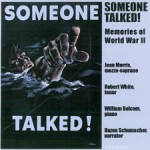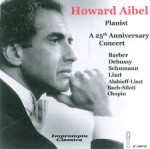Column Name
Title
Someone Talked! Memories of World War II. William Bolcom, pianist; Joan Morris, mezzo-soprano; Robert White, tenor; Hazen Schumacher, narrator. (Equilibrium EQ 95)
Body
For some listeners, this disc might be worth acquiring for no other reason than to hear tenor Robert White sing “The White Cliffs of Dover” and “I’ll be Seeing You,” two of 19 songs from the World War II era offered in a revue called Someone Talked: Memories of World War II. White, a Juilliard voice professor who also earned a master’s degree from the School, shares the vocal duties with mezzo-soprano Joan Morris, while composer William Bolcom (her husband) envelops both with his warm pianism. Linking the songs and giving them context is Hazen Schumacher, former host of the long-running Jazz Revisited on National Public Radio. Schumacher’s brief recollections and commentary make one recall how this war brought the United States together—a feat that no conflict since has accomplished.
White sounds like the quintessential radio crooner throughout, and in several numbers even summons up some unexpectedly engaging whistling. He pulls out all the stops with elegant readings of the timeless “It’s Been a Long, Long Time,” and later, a British standby, “When the Lights Go On Again,” made popular by Vaughn Monroe and His Orchestra in 1943. Morris is equally stirring, and may make some eyes moist with her melancholy version of “We’ll Meet Again.” Yet she is never far from her renowned sense of humor. After White channels the Irish tenor of one’s dreams for “Johnny Doughboy Found a Rose in Ireland,” Morris follows it with a gleeful parody, “Johnny Doughboy Froze His Nose in Iceland.”
This gently dusted-off snapshot was recorded over two days in April 2009 at Brookwood Studio in Ann Arbor, Mich. Engineer David Lau also serves as producer and even photographer, capturing the four smiling principals on the back of the booklet. At a time when many World War II veterans are disappearing, and with them their memories, a project like this serves double-duty, both as entertainment on its own terms, and as a creatively managed time capsule. This brief, well-conceived history lesson offers nostalgia without apology.
A 25th Anniversary Concert. Howard Aibel, piano. Works by Barber, Debussy, Schumann, Liszt, Alabieff-Liszt, Bach-Siloti, and Chopin. (Impromptu Classics, IC-090701)
In another nod to the past, this 1984 recital at the 92nd Street Y by Juilliard alum Howard Aibel is now available as A 25th Anniversary Concert. (The title actually bears a double meaning: the concert was the 25th anniversary of Aibel’s receiving the Naumberg Award, and the CD was released 25 years after the performance.) As a fan of live recordings, I love it when artifacts like this turn up. Even if the sound has a slightly closed-in quality, this is more than offset by the pianist’s energy and the vividness of the occasion.
Aibel earned both a bachelor’s and master’s degree from Juilliard under the tutelage of Rosina Lhévinne and then went on to teach as her assistant for a decade, from 1968 to 1978. From the beginning of this recording, Aibel is on fire in Samuel Barber’s craggy 1949 Piano Sonata, which was also on his Naumberg debut program at Town Hall. Aibel’s pyrotechnics in this keyboard beast—one of the great American examples of the genre—bring immediate and well-deserved bravos. Two bits of Debussy velvet follow: the pensive Reflets dans l’eau from Images I, and Jardins sous la pluie from Estampes.
The disc’s second substantial offering is Schumann’s Papillons, showing Aibel’s ability to make the heart race when needed, only to pull back into a demure lyricism. In a transcription of Widmung, Liszt adds his own virtuosity to Schumann’s tenderness, and Aibel finishes the thought with a delicious pianissimo. The final work on the program proper, Liszt’s Hungarian Rhapsody No. 12, begins innocuously enough, but soon starts to sizzle as the composer’s take on the Hungarian csardas explodes in a breathless vivace. Flying finger fanciers, look no further.
Three encores satisfy an audience obviously hungry for more. Aibel first offers Liszt’s misty transcription of The Nightingale by Alexander Alabieff (1787-1851), followed by Bach’s Prelude in B Minor arranged by pianist Alexander Siloti (1863-1945), who also taught at Juilliard. But from the ovation, it is Chopin’s evergreen Waltz in D-flat Major (“Minute”), dispatched at warp speed, which clearly wins the hearts of all on the premises.






